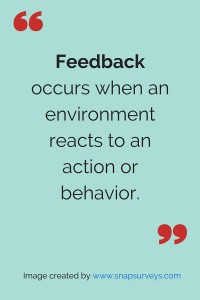5 Reasons why feedback is important to any organization

Who would dispute that feedback is a good thing? Organizations of any size can benefit from feedback. Both common sense and research conclude – feedback, whether positive or negative, and opportunities to turn that feedback in to actionable strategies helps to improve and enhance quality outputs of organizations. It also allows organizations to build and maintain direct communication across the entire organization – employees, suppliers, customers, vendors, and stakeholders.
Feedback is valuable information that can be used to make better informed business decisions. Top performing companies are top performing companies because they consistently set out ways to make their best even better. For top performing companies ‘continuous improvement’ is not just a showy catchphrase. It’s a true focus based on feedback from across the entire organization. Top performing companies are not only good at accepting feedback, they deliberately ask for feedback – and they know that feedback is helpful only when it highlights weaknesses as well as strengths.
Here are the 5 Reasons why feedback is important:
1. Feedback is always there
If you ask someone in your organization when feedback occurs, they will typically mention an employee survey, performance appraisal, or training evaluation. In actuality, feedback is around us all the time. Everytime we speak to a person, employee, customer, vendor, etc., we communicate feedback. In actuality, it’s impossible not to give feedback.
2. Feedback is effective listening
Whether the feedback is done verbally or via a feedback survey, the person providing the feedback needs to know they have been understood (received) and they need to know that their feedback provides some value. When conducting a survey, always explain why respondents’ feedback is important and how their feedback will be used.
3. Feedback can motivate
By asking for feedback, it can actually motivate employees to perform better. Employees like to feel valued and appreciate being asked to provide feedback that can help formulate business decisions. And feedback from client, suppliers, vendors, and stakeholders can be used to motivate to build better working relationships.
4. Feedback can improve performance
Feedback is often mistaken for criticism. In fact, what is viewed as negative criticism is actually constructive criticism – and it is the best kind of feedback. It can help to formulate better decisions to improve and increase performance.
5. Feedback is a tool for continued learning
Invest time in asking and learning about how others experience working with your organization. Continued feedback is important across the entire organization in order to remain aligned to goals, create strategies, develop product and service improvements, improve relationships, and much more. Continued learning is the key to improving.



